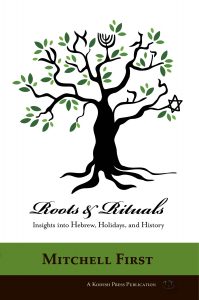
Roots & Rituals: Insights into Hebrew, Holidays and History
Mitchell First
Kodesh Press
I can’t speak for you but this book was 100% up my alley, focusing as it does on linguistics/etymology and history/archaeology, each of which is a subject of interest to me. If any of these – especially the language aspect – is of interest to you, then don’t even bother reading the rest of this review. Rather, just open a new browser tab and order yourself the book.
Still here? Fine. Let me tell you something about it, then.
Mitchell First is a personal-injury attorney and Jewish history scholar with a long-running column in the Jewish Link of New Jersey, which is where the articles collected in this book first appeared. Each topic he writes about is like a mini-mystery, with First playing the role of Sherlock Holmes. At first, each case is unsolvable but once First has assembled the clues and vetted the suspects, the solution has been staring us in the face all along. (Okay, when dealing with matters of history and linguistic origin, the answers are not always conclusive but First always provides compelling evidence. Certainly enough for an indictment if not necessarily a conviction.)
First addresses numerous topics about which people may have wondered, such as the origin and intention of the bracha shelo asani isha (that God did not make me a woman) or the centuries-long lifespans of the people in the book of Genesis. Even more interesting, perhaps, is First’s insight into topics that perhaps we should have wondered about but didn’t. Consider the following example:
In school, you might have been taught that Maccabee means a hammer, suggesting that Judah Maccabee struck like a hammer. Indeed, the word makevet means a battle hammer in Hebrew, so this is a pretty solid idea. You might also have learned that Maccabee is an acronym for the phrase Mi Kamocha B’eilim Hashem (Who among the mighty is like You, God?); this, too, is a nice idea. But now consider this: makevet is spelled with a kuf and kamocha is spelled with a kaf. So how did Judah Maccabee spell his own name? To figure that out, we must turn to the earliest written sources – which happen to be in Greek! So now we must investigate how the Greeks translitered a kaf versus how they transliterated a kuf!
There’s more it that than, and I don’t want to give away any surprises. Suffice it to say that if you enjoy such intellectual twists and turns, this work is replete with them.
Of course, not everyone will necessarily be interested in such phenomena as Egyptian and Akkadian words that appear in the Torah or hapax legomena – words that only appear once in all of Tanach. But if you’re on the borderline, let me sweeten the deal for you: Roots & Rituals is no dry text. Rather, it’s full of First’s trademark wit.
A perfect example of this can be found in First’s bios. Yes, bios, in the plural. As noted, the articles in this book first appeared as part of a newspaper column. Each column was concluded with a brief bio. Normally, a collection such as this would not reprint the author’s bio after each and every article but this one does, for good reason: because each bio is tailored with a joke that ties it into the article you just read.
If that’s not sufficient to pique your curiosity, then let me tantalize you with the fact that First establishes the connection between John Lennon and the plague of arov. If the connection is not apparent, that may be because arov might not be what you always assumed it was.
In tracing the origins of words and practices, First does cite non-Jewish sources, such as Jerome, author of the Vulgate (the Latin translation of the Bible), but traditional Jewish sources, from the Tosefta and the Targum to the Meiri and Rav Hirsch, still dominate. The only thing that might cause some readers discomfort is the recurring idea that certain letters in the Hebrew alphabet may not be as we have them today. (This is the theme of the article “Original Shin and Original Sin,” though there are other letters whose prehistories are crying out for similar treatment.) Those who were raised on Midrashim that describe the letters of the alef-beis as preceding Creation should prepare themselves to recontextualize their thoughts on the matter.
So if you’re curious about the nature of Moshe’s speech impediment, or if you want to know why the root of milchama (war) is lechem (bread), then Roots & Rituals is the book for you. It’s serious, scholarly, well-researched and meticulously sourced. But it’s also engaging, witty and never, ever dull.
Rabbi Jack Abramowitz is Torah Content Editor at the Orthodox Union. He is the author of six books, including The Tzniyus Book and The Taryag Companion. His latest work, The God Book, is available from OU Press as well as on Amazon.
The words of this author reflect his/her own opinions and do not necessarily represent the official position of the Orthodox Union.

